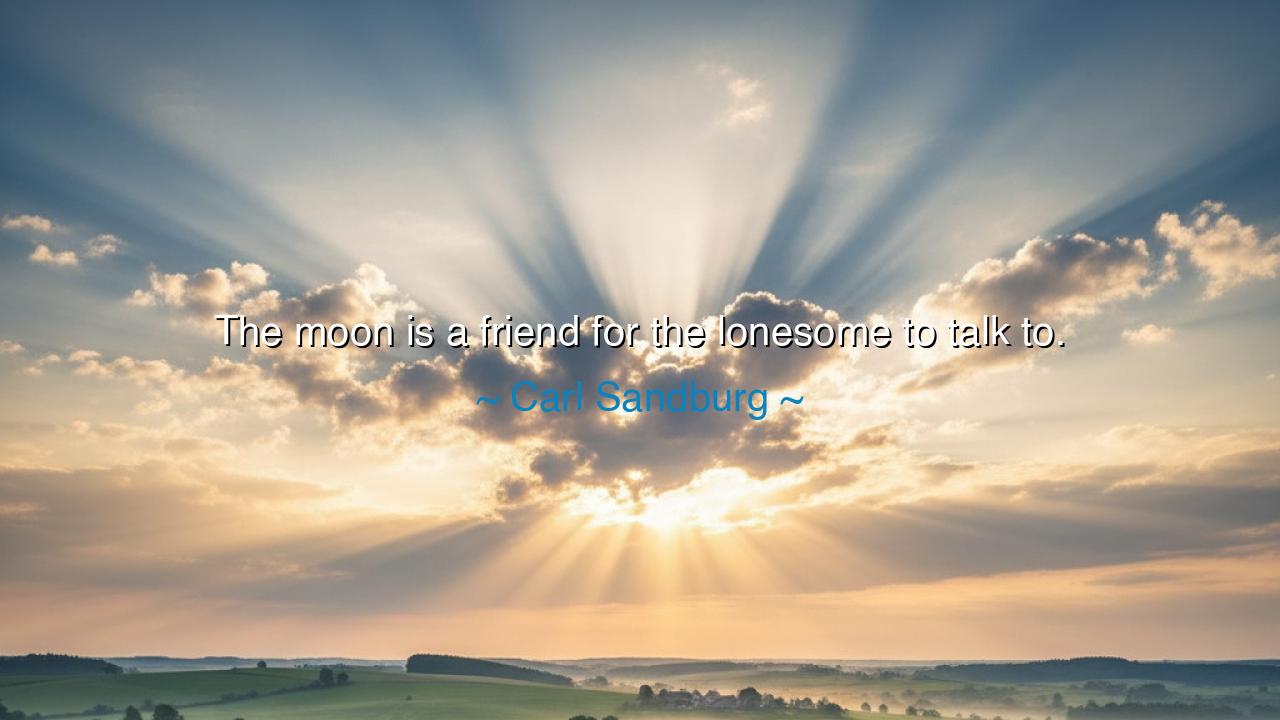
The moon is a friend for the lonesome to talk to.






In the quiet solitude of night, when the world sleeps and the stars whisper their ancient secrets, there is a presence that offers solace to the lonely and comfort to the weary heart. Carl Sandburg—poet, philosopher, and observer of the human condition—once spoke with profound tenderness, saying, "The moon is a friend for the lonesome to talk to." These words, though simple, hold within them a timeless truth: that in the midst of our solitude, the moon becomes not just a celestial body, but a silent companion, a listener to our deepest thoughts, fears, and desires. It is in the moon's quiet presence that we often find the space to reflect, to speak without words, and to discover the hidden truths of our own hearts.
The moon has always been a symbol of mystery and reflection, a guide in the darkness. From the earliest days of humanity, people have looked to the moon not only to mark the passage of time, but to seek comfort in its constant, unwavering gaze. Ancient cultures revered the moon, associating it with various deities and forces of nature. Yet, beyond its mythological significance, the moon has always been a source of quiet companionship. In the same way that a friend offers their ear to listen, the moon listens to the lonely, those whose hearts cry out in the silence of the night. It is a silent friend, present yet unobtrusive, offering a sense of connection when the world feels vast and empty.
Consider the great philosophers of old, who would often seek solitude under the moonlight, contemplating the mysteries of existence. Aristotle, sitting by the shores of the Aegean, would have gazed at the moon with a mind full of questions about the nature of the cosmos. His thoughts, like those of many thinkers before him, were drawn to the moon’s quiet presence, its stillness amidst the turmoil of human life. And in this stillness, they found a kind of peace, a solace in knowing that though they were alone in their reflections, they were not entirely isolated in the vastness of the universe. The moon was their companion in thought, a reminder that even in solitude, the universe listens.
In our own time, too, there are moments when we seek the moon’s company, especially in times of heartache, loneliness, or despair. Think of the poet Sylvia Plath, whose own words echoed the pain of isolation. In the dark of night, as she gazed at the moon, she found herself conversing with it in her soul’s deepest corners. For the lonely, the moon becomes more than just a distant sphere—it becomes a mirror, reflecting the inner world of the observer, their emotions, their longings, their regrets. The moon listens, not with ears, but with the quiet presence of the cosmos itself, offering understanding when the world seems too noisy to hear the heart.
Sandburg’s words hold a powerful lesson for us all. Loneliness is a part of the human experience—an inevitable, though sometimes painful, aspect of our lives. Yet, the moon teaches us that even in our solitude, we are not truly alone. The universe, in its vastness, offers us companions in unexpected places. The moon, in its eternal silence, speaks to us of connection, of shared human experience, and of the comfort that can be found in the stillness. It is a friend to those who feel abandoned or forgotten, offering its light as a beacon in the darkest of times.
O children of the future, remember that in the moments when you feel the weight of isolation, look to the moon. Let it be a reminder that, even in the deepest silence, there is a witness to your journey—a companion who listens without judgment and offers comfort in its steady, unchanging light. And as you walk through life, remember that just as the moon is a friend to the lonely, so too can you be a friend to those who walk alone. Sometimes, the greatest gift we can offer is simply our presence, the quiet act of being there for others, even when words fail.
The lesson, then, is one of both humility and compassion. Just as the moon shines without asking for anything in return, so too can we offer our presence to those in need. The moon shows us that even in the darkest moments, we are never truly without companionship. And in turn, we can be that light for others, shining quietly, but steadily, offering the warmth of our friendship to those who, like us, sometimes need someone to talk to, even in silence. The moon, our silent friend, reminds us that connection is eternal, and we, too, can offer that gift to others in their times of need.






AAdministratorAdministrator
Welcome, honored guests. Please leave a comment, we will respond soon